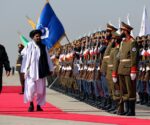Express readers overwhelmingly support return of National Service | World | News
Express readers overwhelmingly back the reintroduction of National Service amid heightened warnings of World War 3.
In its latest poll, Express.co.uk asked readers whether the UK should introduce mandatory military service with the result showing the vast majority in favour.
A total of 81 percent of readers said “yes” to the idea while 17 percent said no and two percent responded “don’t know”, the poll shows.
National Service in Britain ended in 1960, with the last national servicemen discharged in 1963. It came into force in January 1949 and saw all physically fit males between the ages of 17 and 21 serving in one of the Armed Forces for 18 months.
After completing National Service, former servicemen stayed on a reserve list for four more years. In 1950, the period of service was extended to two years, with national servicemen participating in military operations in Korea, Cyprus, Malaya and Kenya during the 1950s.
More than two million men took part in National Service, which was introduced after World War 2 to address manpower shortages in the forces at a time when Britain was trying to retain its empire while also taking part in the occupations of Germany and Japan.
Low birth rates in the 1930s also meant there were fewer young men available to serve in the military after the 1939-45 global conflict.
Recent MoD figures show the size of Britain’s Armed Forces shrank by more than 7,000 soldiers, sailors, and airmen and women to 183,130 personnel last year despite mounting threats.
When only full-time, fully-trained members of the Armed Forces are counted, the number fell by three percent (or 3,870 servicemen and women) to 130,660 personnel in the 12 months to January 1 compared with the previous year.
It has been widely reported that Britain’s Armed Forces are also struggling to recruit and retain the men and women the country would rely on should the UK be drawn into war. The MoD has said recruitment and retention are priorities and that it has awarded large pay increases on top of a commitment to spend billions improving accommodation for personnel.
Defence Secretary Grant Shapps said in January that Britain was facing a “pre-war world”, while General Patrick Sanders, the Chief of the General Staff, referred to a “1937 moment” in the wake of Russia‘s full scale invasion of Ukraine.
General Sanders said Russian President Vladimir Putin and his expansionist ambitions pose the greatest threat he has ever known to democracy, sovereignty and the freedom to live without violence. The head of the Army has also said Britain should train a “citizen army” ready to fight a future land war.
The warning come as Russia is reportedly building a coalition with China, Iran and North Korea, with US think tank the Institute for the Study of War (ISW) highlighting “multiple indicators” which it says suggest “Russia is preparing for a large-scale conventional conflict with NATO”.
As a NATO member, Britain would be drawn into such a war, due to the military alliance’s key tenet that an attack on one member requires a response from all.
Some analysts and military experts suggest that if Putin were to defeat Ukraine, the Russian dictator will turn on Western countries, starting with Baltic states, Latvia and Lithuania.
Ex-army commander Colonel Hamish de Bretton-Gordon recently told The Sun: “I think he is doing all he can at the moment [in Ukraine]. He is throwing everything into the ‘meat grinder’, hoping to outlast Western support, which is likely to wain at the end of this year.
“If Putin succeeds in Ukraine he will go to war with the West. He will attack Latvia and Lithuania first – and they are both NATO.”









